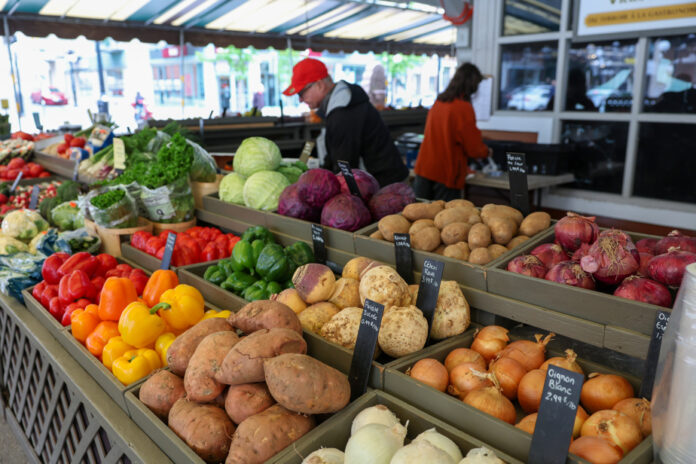The numerous bad weather may have affected the harvests of several farmers, sometimes even beyond repair, but this has not harmed the province’s public markets, which nevertheless continue to welcome thousands of Quebecers every week.
The Quebec Public Markets Week ended on Sunday, after ten days of activities. It marks the beginning of a period rich in harvests for Quebec agricultural producers, underlines Jean-Nick Trudel, director general of the Association des marchés publics du Québec (AMPQ).
Many producers have had their share of challenges this year, whether due to spring frost, drought or flooded land due to heavy rains.
“So far, what we notice is that the market stalls are still well stocked, even if some products that we see on the tables represent only a fraction of what has been sown or projected into the market gardening calendar,” notes Mr. Trudel.
Many producers are still showing creativity to make these simple errands a pleasant experience, says Johanick Riendeau, director of the Biofood Industry Council of Estrie.
“In the MRC du Haut-Saint-François, a mixologist toured the markets to offer cocktails made from local products, she illustrates. Elsewhere, there are activities, shows and lots of initiatives to make the markets more attractive.
“Public markets are carried by people who give a lot of their time, often volunteers,” she continues. We have very resilient people, who are trying to meet the demand, but we have to admit that it has been a difficult year for them. »
According to Mr. Trudel, the traffic of public markets is favored by the structures they have set up to welcome customers.
“The markets are open rain or shine. We already knew that, but a season like this confirms it: when people can spend time in the dry, they are more likely to come to the public market,” he says.
As the season is not over, it is premature to draw up an assessment. However, early observations point to a satisfying summer for public markets, although pandemic participation records are unlikely to be matched.
“We may not have the same attendance statistics, but consumers seem to have become accustomed to adding a visit to the market into their routine,” notes Ms. Riendeau.
In metropolitan France, where public markets are permanent and open year-round, the situation is different. “Since our merchants are there for a longer period, we often have producers who offer a greater number of products or who source their supplies from beyond the Montreal region, illustrates Nicolas Fabien-Ouellet, General Manager of the Company. Montreal’s public markets. If a producer has a more difficult start to the season in asparagus, he can make up for it a little later with sweet corn and strawberries, for example. »
If the vagaries of the weather influence the selling price of certain fruits and vegetables, Jean-Nick Trudel is of the opinion that it is more advantageous for consumers to buy directly from the producer, whether in a public market , on the farm or through a family farmer service.
“There is often a fluctuation in prices throughout the same season, especially in relation to availability,” he recalls. For example, the price of the first strawberries of the season will not be the same as during the period when they are harvested in abundance. »
The general manager of the AMPQ believes that our perception of the fair price may be influenced by the large discounts that are sometimes found in supermarkets on products available in large quantities.
However, the bill is less likely to vary when shopping at the stalls rather than in the aisles.
“Public markets bring together a diversity of producers and merchants,” recalls Mr. Fabien-Ouellet. This is still where we find the cheapest products in season. »
“Prices in public markets remain very competitive,” notes Mr. Trudel. We do not notice a price increase as significant as in grocery stores and this is due to the fact that we buy directly from the producer. There is no cost associated with processing or distribution. »
As proof, he says, a study in Nova Scotia showed that the prices of produce in the province’s public markets had changed little over the past five years. Such statistics do not exist in Quebec.
“At the market, you can speak directly with the producer. He can tell us how he set his price, how his season is going, says Riendeau. You can’t do that at the supermarket. »
Mr. Fabien-Ouellet also believes that producers are concerned about increasing their prices in order to retain their customers. “Several people have already told me that if to cover their costs, they have to increase their product by $1, they prefer to absorb half of it so as not to pass it all on to the consumers,” he says.
As harvest season will be in full swing for a few more weeks, Mr. Trudel urges consumers to stock up while the price of produce is still favorable.
“It’s time to stock up for canning or freezing food for the winter,” he says. If prices are found to be high right now, they will likely be even higher in a few months. »















